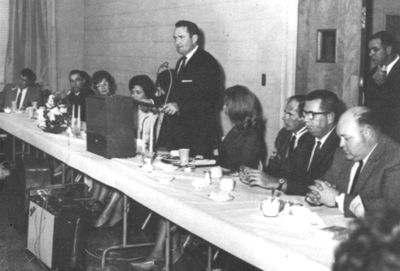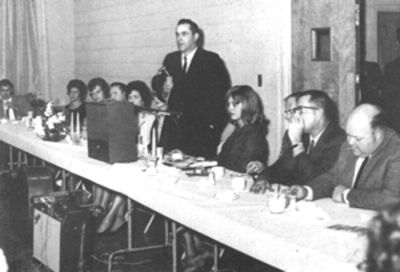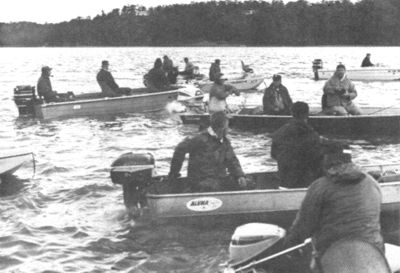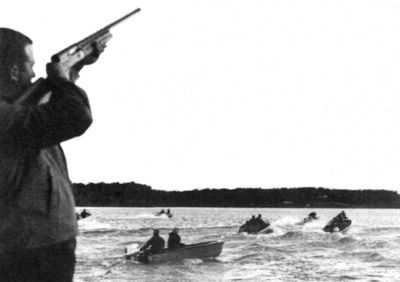
Top winners in the 1967 Tennessee Open Invitational Bass
Tournament at Camden October 27-29 were, left to right,
Billy Phillips, Jackson, TN; Bill Dance, Memphis, TN;
Charlie Bumpus, Clarksville, TN; Harvey Mastin, Smyrna,
TN; and Larry Switzer, Herrin, IL.
by Ed Howze
(As originally appeared in the Feb. 1968 Tennessee Conservationist magazine)
J. W. WARD, President of the Camden, Tennessee, Chamber of Commerce, replied, I don't know if we're big enough to handle something like this, but we would certainly like to try, to Glen Andrews' question if Camden would sponsor the first annual Tennessee Open Invitational Bass Tournament on Kentucky Lake. This meeting took place the last week of July, and by October 27, the opening day of the toumament. it had been amply proved Camden was indeed big enough.
It had to be big enough to house, feed and supply eighty-one contestants who came from as far away as New Jersey, Tampa, Florida, Virginia, and Springfield, Missouri, representing sixteen different states in all.

It had to be big in heart and genuine southern hospitality, as exemplified by Mayor Ray Smith's welcome at a reception banquet the night before the contest began.
Smith assured the contestants the city of Camden was at their disposal and that any request for help or assistance needed by contestants during the tournament would be happily and quickly granted by the people of Camden.

This welcome was echoed by others at the banquet. Dr. W. H. Blackburn, member of the Tennessee Game and Fish Commission who represents the area; Vice Captain Dr. Robert L. Horton of the Coast Guard Auxiliary Division XI who told the contestants his men would be on hand throughout the tournament to provide search and rescue operations should any of the fishermen need assistance; and by Tournament Director Andrews, who, through the long months of organizing the tournament had himself experienced Camden's bend-over-backwards brand of assistance.

The rules of the tournament, as explained by Andrews at the banquet, were simple: Scoring would be done on a point system, three points per ounce for black bass and one point per ounce for white bass, with a minimum length of ten inches on black bass and a limit of ten on both white and black bass. After the first day of fishing, the tournament would be divided into four separate flights and the contestants would then fish for prizes in whatever flight their first day's score had placed them in.
This picture shows the types of equipment the first Tennessee tournament fishermen used, up to 18 hp motors and 14 foot aluminum boats. This shot was taken at the original Birdsong Dock on Birdsong Creek Embayment.
The observer system placed a man in each contestant's boat who stayed with that man until he had delivered his catch for that day to the official weigh-in station at the fairgrounds in Camden. The duties of the observer were merely to ride in the boat with the contestant. He would not be allowed to assist the contestant in any way, and should a violation of the tournament rules occur, he must report it to the tournament officials at the end of the day. It was pointed out that no contestant would be allowed to leave his official starting dock before 7:30 AM, and must be back by 6:00 PM.
 Left, the Browning Automatic shotgun belonging to Bobby Keast was fired to sound the start of the tournament, or "blast-off" at Birdsong Dock, one of the official tournament check-in sites.
Left, the Browning Automatic shotgun belonging to Bobby Keast was fired to sound the start of the tournament, or "blast-off" at Birdsong Dock, one of the official tournament check-in sites.
Friday found ideal fishing conditions on Kentucky Lake and at 6:00 PM all contestants, except one, had reported back in to their official docks on time. Don Staser, of Lansing, Michigan, was two minutes late according to the official starter's watch at Bass Bay Resort where he checked in. Don had caught several nice bass including the largest bass caught that day, a six pound 8 ounce black, and his point total of 682 points was leading the field. The five tournament judges listened to Don's story of why he was two minutes late and then talked with the official starter and the observer who had been with Don that day. Don had not taken a watch with him and was relying on his observer's watch to tell him how much fishing time he had left. It turned out that his observer's watch was seven minutes slow. The judges, after hearing all the evidence, voted in secret ballot and the decision was unanimous to disqualify Don's catch for that day and start out the next day with no points on the score board. Don accepted the verdict of the judges and later on proved to everyone that while he is only five feet six inches tall, he is a giant among sportsmen.
Saturday was highlighted by Charlie Bumpus, of Clarksville, Tennessee catching a six pound fourteen ounce black bass which along with his other fish put him in second behind Billy Phillips of Jackson, Tennessee. Bill Dance, of Memphis Tennessee, roared back from 219 points on Friday with 858 points on Saturday to jump from 14th to third place in the championship flight.
Following Sunday's fishing, Phillips had won the championship flight with a total of 1741 points that earned him $2,000 and the championship trophy for his efforts. Dance was second with 1731 points, or a difference of only 3 1/2 ounces. Bumpus was third with 1525 points and his 6 pound 14 ounce black bass, being the largest caught during the tournament, earned he and his wife a weeks expense paid vacation, courtesy of the Holiday Inns, to the Holiday Inn in the Grand Bahama Islands. Harvey Mastin was fourth with 1215 points, while Larry Switzer finished fifth with 1180 points.
John Fox, of Memphis, Tennessee, was the winner of the first flight. Guy Thomas, of Rogers, Arkansas, was the winner of the second flight and Ken Letch, of Springdale, Arkansas, was the winner of the third flight. The five man team of Bill Dance, Glen Cossey of Higden, Arkansas; Jerry McKinnis of Little Rock, Arkansas; Jim Rogers of Lamar, Missouri; and Kent Smith of Little Rock, Arkansas, won the team championship.
After the prize money and trophies had been awarded at the awards banquet Sunday night, it was announced that the Tennessee Open Invitational Bass Tournament would be held again next year in the early part of October. It was also announced that the next Professional Sports Fishing Association Tournament would be held on Sam Rayburn Lake near Lufkin, Texas, the first week in April, 1968.
Don Staser, the victim of disqualification, then told the group that had he been in the position of the judges, he would have voted the same way and that this was the only fair and honest way to conduct a fishing tournament and more important, even though he didn't win, he was proud to have been a part of it.
This tournament marked many firsts: the first professional fishing tournament held in Tennessee, the first tournament anywhere to use flight bracketing and the buddy observer system, the first tournament sanctioned by the fledgling Professional Sports Fishing Association.
The PSFA, a non-profit organization devoted to the promotion of fishing and fishermen across the nation was organized last spring with Glen Andrews as President, a nationally known group of sportsmen serving as the Board of Directors, and a shoe-string budget.
Patterned after other national sports affiliations, the PSFA is the first in the field of fishing, and its concept apparently fulfills a need expressed by many fishermen, especially those interested in professional tournament fishing. Although a present major concern of this group is the promotion of tournaments, in the future such educational projects as fishing clinics and instructional literature are planned. But the beauty of the PSFA lies in its "everyman" attitude. From week end line-dunker to those who follow the tournament trail, each member benefits from the PSFA to the extent that he belongs to an organization that conceivably can do much to advance the sport of fishing.